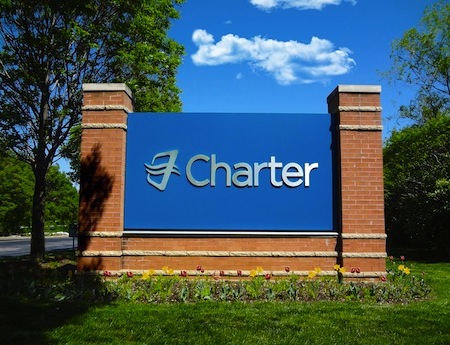Charter Free to Charge Streaming Video Companies Interconnect Fees
A federal appeals court tosses key restrictions related to the cable company's 2016 purchases of Time Warner Cable and Bright House Networks

The smarter way to stay on top of the streaming and OTT industry. Sign up below.
You are now subscribed
Your newsletter sign-up was successful
A federal appeals court has thrown out two of the Charter/Time Warner Cable broadband-related conditions, the ones "prohibiting Charter from charging programming suppliers for access to its broadband subs" — no charging for interconnects — and the one "requiring New Charter to provide steeply discounted broadband service to needy subscribers," with the court saying it essentially had no choice after the FCC failed to defend them.
Three customers of the combined Charter/Time Warner Cable/Newhouse, represented by the Competitive Enterprise Institute, had filed suit saying the conditions were responsible for their cable bills going up and wanted the conditions set aside due to that "injury."
Because the FCC did not defend the conditions, imposed by the Tom Wheeler FCC, the court vacated both, but made clear that the other conditions — usage-based pricing and buildout conditions— remained in force. The petitioners had challenged them as well. Charter separately is looking to get out from under the usage-based pricing conditions.
A three judge-panel of the U.S. Court of Appeals for the D.C. Circuit said the FCC appeared to have imposed irrelevant and non-germane conditions, but did not have to get to those issues.
"We need not resolve these questions, however, for there is a simpler ground of decision," the court said. "The lawfulness of the interconnection and discounted-services conditions are properly before us, yet the FCC declined to defend them on the merits. The agency’s only explanation for doing so was its view that we cannot reach the merits. Having lost on that question, the FCC has no further line of defense. “Because the Commission chose not to argue the merits in the alternative, we have no choice but to vacate the challenged portions of the order.”
The decision was two to one, with judge David Sentelle dissenting. Sentelle did not weigh in on the merits, but dissented because he thought the court should not be weighing in at all. "[T]here is insufficient evidence to show that the injury to the consumer appellants would be redressed if this court were to order the vacation of the conditions imposed by the government on New Charter," he wrote. "It may be that New Charter would take actions beneficial to the appellants, but it is not the case that this court can redress their injuries."
Free State Foundation president Randolph May focused on the court's opining on non-germane conditions.
The smarter way to stay on top of the streaming and OTT industry. Sign up below.
Contributing editor John Eggerton has been an editor and/or writer on media regulation, legislation and policy for over four decades, including covering the FCC, FTC, Congress, the major media trade associations, and the federal courts. In addition to Multichannel News and Broadcasting + Cable, his work has appeared in Radio World, TV Technology, TV Fax, This Week in Consumer Electronics, Variety and the Encyclopedia Britannica.

